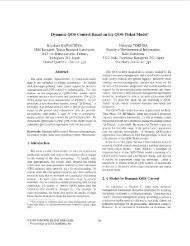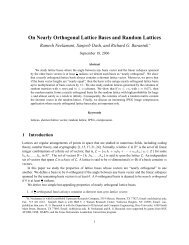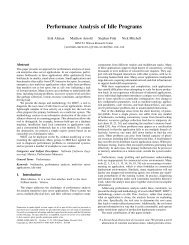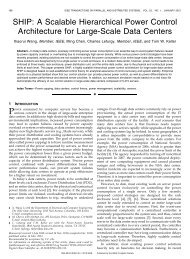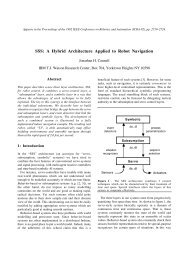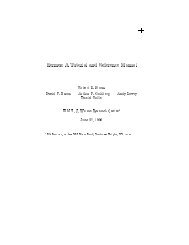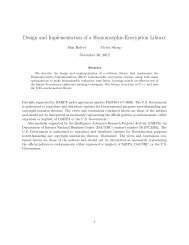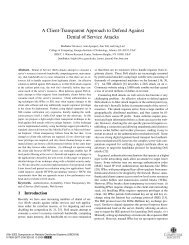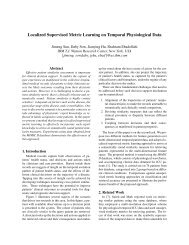Ownership You Can Count On: A Hybrid Approach - Researcher - IBM
Ownership You Can Count On: A Hybrid Approach - Researcher - IBM
Ownership You Can Count On: A Hybrid Approach - Researcher - IBM
Create successful ePaper yourself
Turn your PDF publications into a flip-book with our unique Google optimized e-Paper software.
superclass of T, or any subclass of T. Then the code cannot<br />
possibly destroy any object which can be held in a variable of type<br />
T, and therefore any non-owning variable or temporary of type T<br />
whose lifetime is contained in the block of code need not hold a<br />
reference count.<br />
As an example, consider the following loop, which iterates<br />
down a linked list, adding the integer values which are found in<br />
each node of the list:<br />
Node ^first = construct();<br />
int sum = 0;<br />
for (Node n = first ; n != null ; n =<br />
n.next)<br />
sum += n.i;<br />
A traditional reference-counted implementation would<br />
increment and then decrement the reference count of each node in<br />
the list as it is pointed to by the loop variable n. The Gel compiler<br />
can optimize these reference counts away: the variable n is live<br />
only during the loop execution, and no code in the loop mutates a<br />
owning pointer of type T ^, where T is Node or any superclass or<br />
subclass of it (indeed, the code mutates no owning pointers at all.)<br />
And so no Node object can possibly be destroyed during the loop.<br />
The compiler implements this optimization interprocedurally.<br />
Suppose that we modify the loop body above to call n.Get(),<br />
where the Get() method merely returns the instance variable i.<br />
Then the optimization still holds, since the compiler recognizes<br />
that the Get() method also mutates no owning pointers of type<br />
Node.<br />
To implement this optimization, the compiler generates a call<br />
graph of all methods in the program being compiled. Using this<br />
graph, the compiler computes, for each method, the set of owning<br />
types which may be mutated during a call to M. When compiling<br />
each method, the compiler generates a graph of control flow in the<br />
method. For each non-owning local variable (or temporary value<br />
in a expression), the compiler examines the control flow nodes<br />
where the variable is live and generates the set of owning types<br />
which may be mutated during the variable's lifetime, including<br />
types which may be mutated during method calls invoked from<br />
those nodes. If none of these types are a supertype or subtype of<br />
the variable's own type, the compiler does not bother to count<br />
references from the variable to any object.<br />
5. BENCHMARK PERFORMANCE<br />
To compare Gel's performance with that of languages using<br />
manual memory management and languages using garbage<br />
collection, we've implemented several small benchmark programs<br />
in C++, Java, C# and Gel. The source code to these benchmarks is<br />
available at the Gel project site. The benchmarks include the<br />
following:<br />
• sort: on each of a series of iterations, generates a list of<br />
1,000,000 randomly generated integers and sorts them using<br />
a recursive mergesort algorithm.<br />
• sortstring: like the sort benchmark, but uses a list of<br />
400,000 randomly generated strings.<br />
• binarytrees: allocates and frees a large number of<br />
binary trees of various sizes. This program is from the<br />
Computer Language Shootout Benchmarks at<br />
http://shootout.alioth.debian.org/.<br />
• self-compile: compiles a 73,000-line Gel program<br />
(consisting of 10 copies of the Gel compiler concatenated<br />
together, with classes renamed in each copy to avoid<br />
duplicate class definitions)<br />
We've measured the performance of these benchmarks on a<br />
computer with a 1.83 Ghz Intel Core 2 Duo processor and 2 Gb of<br />
RAM, running Ubuntu Linux 6.10. The C++ benchmarks (and the<br />
C++ code output by the Gel compiler) were compiled using gcc<br />
4.1.2 using the -O2 optimization level. We used the Sun JDK<br />
1.5.0_08 to compile and run the Java benchmarks; we used the<br />
"server" (not "client") VM from the JDK. We compiled and ran<br />
the C# benchmarks using version 1.1.17.1 of Mono [22], an opensource<br />
implementation of C#. Note that Mono uses the Boehm<br />
garbage collector [21] .<br />
For each benchmark run, we collected the following statistics:<br />
• CPU time (including both user and system time) in seconds.<br />
• Maximum virtual memory. This includes all pages mapped<br />
into the process's address space, including those not<br />
resident in physical memory, and including both private and<br />
shared pages.<br />
• Maximum resident memory. This includes only pages<br />
resident in physical memory. (Both private and shared pages<br />
are included.)<br />
• Maximum private writeable virtual memory. This includes<br />
only pages which are private to the process and are<br />
writeable. (Both resident and non-resident pages are<br />
included.)<br />
We collected the virtual memory statistics using ptime, a<br />
program we wrote specifically for Linux; its source code is<br />
available on the project site.<br />
Here are the benchmark results; a discussion follows below.<br />
Benchmark: sort 5<br />
CPU (sec) virtual (Mb) resident (Mb) private (Mb)<br />
C++ 7.1 18.3 16.5 15.9<br />
Java 5.2 709.5 74.7 651.4<br />
C# 3.3 42.3 27.4 30.4<br />
Gel 4.8 18.3 16.6 15.9<br />
Benchmark: sortstring 5<br />
CPU (sec) virtual (Mb) resident (Mb) private (Mb)<br />
C++ 4.4 25.4 23.6 23.0<br />
Java 6.5 708.0 127.8 650.8<br />
C# 6.8 50.8 33.5 38.9<br />
Gel 5.1 34.8 33.0 32.4<br />
We have implemented the Gel compiler both in C# and in Gel,<br />
so we use the compiler itself as an additional, larger benchmark:



